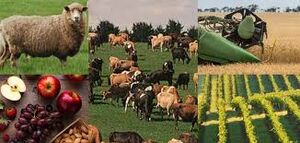Many thanks to our Patrons who cover ~2/3 of our hosting bill. Please join them if you can.
Big Agriculture
Jump to navigation
Jump to search
(Food, Industry) | |
|---|---|
 | |
| Interest of | Cargill family, Children's Health Defense, Louise Fresco, Tyrone Hayes, Sebastian Seymour, Vandana Shiva, US/Senate/Committee/Agriculture Nutrition and Forestry |
| A handful of food and chemical corporations completely dominate what we eat and how food is made, supposedly in competition with one another. | |
Big agriculture (Big Ag) is a shorthand for referring to a handful of large companies which completely dominate and monopolize all aspects of food production and regulation. These include seed producers, chemical and fertilizer companies, biotech (genetic engineering) and retailers.
- There are somewhere between 50 million and 100 million farms in the world[1] (excluding those smaller than 6-7 hectares). But about half the crops produced by those farms rely on the seeds, fertilizers, and pesticides supplied by a mere dozen or so companies.
- Most of those crops are bought, traded, and transported around the world by another half dozen.[2]
- The so-called Big Six[3], Monsanto, Syngenta, Dow AgroSciences, DuPont, Bayer, and BASF produce roughly three-quarters of the pesticides used in the world. The first five also sell more than half the name-brand seeds that farmers plant, including varieties modified for resistance to the very pesticides they also sell. Meanwhile, if farmers want fertilizer, a list of 10 other companies, starting with PotashCorp, account for about two-thirds of the world market.
- Around 80 percent of major crops pass through the hands of four traders: Archer-Daniels-Midland (ADM), Bunge, Cargill, and Louis Dreyfus. ADM processes about a third of all soybeans in the United States and a sixth of those grown around the globe.
- On the retail side, there are a huge selection of brands, but most of them come from a handful of companies. And the retail outlets are concentrated in a few large supermarket chains.
Contents
Impact on nutrition and health
- Many of the product choices made by Big Ag are impossible to avoid in everyday life, like high-fructose corn syrup (Archer Daniels Midland) or Monsanto with its herbicide Roundup and genetically engineered foodstuff and seeds.
- Industrial meat production in megafarms destroys animal welfare and necessitates a high input of chemicals and medicines,[citation needed] while creating a huge waste problem.
Great Power politics
For decades, the United States follows a conscious strategy of controlling strategic basic foods, preferring to grow and export staples (grains) while letting countries in the global south export cash crops (coffee).[citation needed]
Examples
| Page name | Description |
|---|---|
| Archer Daniels-Midland | American multinational food processing and commodities trading corporation |
| DuPont | Big chemical company. Supplied large amounts of explosives to many US wars. Lots of chemical products and artificial fibers. Since the 1990s, focusing heavily on genetic manipulation. |
| Rabobank | |
| Yara International | Chemical company that is one of the world’s largest producers of synthetic fertilisers |
A Big Agriculture victim on Wikispooks
| Title | Description |
|---|---|
| FAO | UN agency captured by Big Food, Big Ag and Big Chemical. |
Related Quotations
| Page | Quote | Author | Date |
|---|---|---|---|
| Archer Daniels-Midland | “The competitor is our friend and the customer is our enemy....There isn't one grain of anything in the world that is sold in a free market. Not one! The only place you see a free market is in the speeches of politicians. People who are not in the Midwest do not understand that this is a socialist country."” | Dwayne Andreas | 1995 |
| Bill & Melinda Gates Foundation | “my full-time work at the foundation is mostly about vaccines and seeds” | Bill Gates | 18 February 2010 |
| Mae-Wan Ho | “What makes genetic engineering biotechnology dangerous, in the first instance, is that it is an unprecedented, close alliance between two great powers that can make or break the world: science and commerce. Practically all established molecular geneticists have some direct or indirect connection with industry, which will set limits on what the scientists can and will do research on, not to mention the possibility of compromising their integrity as independent scientists.
. The worst aspect of the alliance is that it is between the most reductionist science and multinational monopolistic industry at its most aggressive and exploitative. If the truth be told, it is bad science working together with big business for quick profit, aided and abetted by our governments for the banal reason that governments wish to be re-elected to remain in ‘power.’” | Mae-Wan Ho | 1997 |
| Vandana Shiva | “When Bill Gates pours money into Africa for feeding the poor in Africa and preventing famine, he’s pushing the failed Green Revolution, he’s pushing chemicals, pushing GMOs, pushing patterns.” | Vandana Shiva | |
| Vandana Shiva | “The gradual spread of sterility in seeding plants would result in a global catastrophe that could eventually wipe out higher life forms, including humans, from the planet.” | Vandana Shiva | |
| Vandana Shiva | “If you look at the graph of the growth of G.M.O.s, the growth of application of glyphosate and autism, it’s literally a one-to-one correspondence. And you could make that graph for kidney failure, you could make that graph for diabetes, you could make that graph even for Alzheimer’s.” | Vandana Shiva | |
| Craig Venter | “Agriculture as we know it needs to disappear...We can design better and healthier proteins than we get from nature.” | Craig Venter | 30 May 2012 |
Many thanks to our Patrons who cover ~2/3 of our hosting bill. Please join them if you can.
References
- ↑ https://www.google.com/url?sa=t&rct=j&q=&esrc=s&source=web&cd=4&ved=0CEQQFjAD&url=http%3A%2F%2Fciteseerx.ist.psu.edu%2Fviewdoc%2Fdownload%3Fdoi%3D10.1.1.146.4632%26rep%3Drep1%26type%3Dpdf&ei=khumUdf2IIiL0QHjrYGYBA&usg=AFQjCNFw2s-j7T4aN9Bs88uSuqfV4rmCgQ&sig2=dKG2591eQiMW9JtWBfbb9w
- ↑ https://spectrum.ieee.org/energy/environment/everything-you-always-wanted-to-know-about-big-ag
- ↑ https://www.seedsavers.org/site/pdf/HeritageFarmCompanion_BigSix.pdf